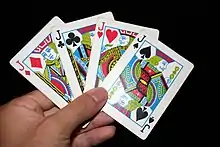Bauernheinrich
Bauernheinrich ("Farmer Henry") is a card game for four players that is played in the region of Anglia in the north German state of Schleswig-Holstein. Its origin is unknown. It is played with a normal Skat pack. The winner is the one to 'go out' first. An unusual feature of this game is that each player has their own trump suit and so can trump others with it; a feature shared with the Czech game, Dudák, and the Russian game, Svoi Kozyri. It is a member of the 'beating game' family.[3][4]
 The 4 highest trumps | |
| Origin | Schleswig-Holstein, Germany |
|---|---|
| Type | Shedding / Beating |
| Players | 4 |
| Cards | 32 |
| Deck | Skat pack |
| Play | Clockwise |
| Card rank (highest first) | ♣J ♠J ♥J ♦J TA TK TQ T10-7 A K Q 10-7 (led suit) |
| Related games | |
| Calypso,[1] Dudák, Hund, Svoi Kozyri[2] | |
Description
The cards rank as follows (highest first): Ace (Ass), King (König), Queen (Dame), 10, 9, 8, 7 The Jacks (Bauern or Buben) have a special role as permanent trumps and rank above all the other cards. The ranking of the Jacks, highest first, is: Clubs (Kreuz), Spades (Pik), Hearts (Herz) and Diamonds (Karo). If a German-suited pack is used the Obers play the role of Queens and the Unters the role of Jacks. The ranking of suits is then: Acorns, Leaves, Hearts and Bells. One of the nicknames for a Jack in German is Bauer, which also means "farmer", hence the name of the game means something like "Farmer Henry".
Aim
Bauernheinrich is a shedding game; the aim is to be the first to get rid of one's cards.
Rules
The following rules are based on those by Spielregeln.[4]
Preparation
The cards are shuffled and dealt to all four players in anti-clockwise order in packets of 3, 2 and 3 respectively, so that everyone ends up with a hand of 8 cards. They are kept concealed from the other players. Next, trumps are determined. The player with the Ace of Clubs announces Clubs as his trump suit e.g. with the words "I have Clubs!" ("Hier ist Kreuz!"). In clockwise order the other players have Spades, Hearts and Diamonds as their trump suits, regardless of the cards which they actually hold.
Playing
| Normal game | |||
| Permanent trumps (highest to lowest) | |||
| ♣J | ♠J | ♥J | ♦J | |||
| Suit cards (highest to lowest) | |||
| Clubs | Spades | Hearts | Diamonds |
| ♣A | ♣K | ♣Q | ♣10 | ♣9 | ♠A | ♠K | ♠Q | ♠10 | ♠9 | ♥A | ♥K | ♥Q | ♥10 | ♥9 | ♦A | ♦K | ♦Q | ♦10 | ♦9 |
The player with the Ace of Clubs leads by playing a card of his choice to the table. Play is clockwise. The next player must:
- Head the trick with a higher card of the same suit ("follow suit") if possible; but if unable to...
- Head the trick with a trump (in this case a Spade or a Jack) – if a Spade was played, the trump played to it must be higher;
- If unable to head the trick, the player must pick up the incomplete trick and add it to his hand cards, i.e. in this case the single card.
Once the trick is taken, it is the next player's turn to lead to the next trick. If a second card is played, it is again the turn of the next player (whose trump suit is Hearts) to play to the trick. The previously played card must always be followed or trumped. If the player picks up, he must always take the whole trick i.e. up to three cards. If a player cannot follow suit or trump, he must pick up.
The maximum number of cards dealt per trick equals the number of players. So the player who deals the fourth card must either add the trick to his hand if he was unable to head it or take the four cards (the whole trick) out of play. He then deals a new card.
Winning
The first player to get rid of all his cards has won. The others continue, now playing tricks with a maximum of 3 cards, i.e. a new trick started after the third card of the previous one. Finally, the last two players play for two cards per trick.
If a trick is started with four players and during the trick a player places his last card and goes out, the trick is still played to the end with four cards. Only the next trick does the number of cards played to three cards. The same applies when the next player goes out.
The game is played until the last two players have finished in third and fourth place. The cards have no point value, and the remaining cards are not counted towards the last player. So there are no tournaments in which an overall winner is determined from a large number of games.
References
- Arnold, Peter (1995). The Book of Card Games. Barnes & Noble, USA
- McLeod, John (2000). "Svoi Kozyri" at www.pagat.com. Retrieved 22 Sep 2019
- Beating Games at www.pagat.com. Retrieved 25 Jun 2019
- Bauernheinrich at spielregeln.de. Retrieved 4 Feb 2020.
